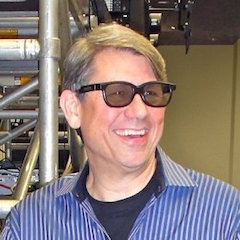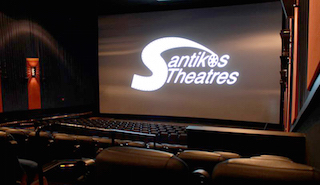 Laser protection was one of the big stories of last month’s CinemaCon convention. All four projector manufacturers featured laser technology in their exhibits and all four announced significant sales. Many people can claim some measure of credit for laser projection’s success in digital cinema but none more than Bill Beck. His advocacy for the technology, which goes back more than a decade, has justifiably earned him the title The Laser Guy.
Laser protection was one of the big stories of last month’s CinemaCon convention. All four projector manufacturers featured laser technology in their exhibits and all four announced significant sales. Many people can claim some measure of credit for laser projection’s success in digital cinema but none more than Bill Beck. His advocacy for the technology, which goes back more than a decade, has justifiably earned him the title The Laser Guy.
In 2004 Beck founded Laser Light Engines where he developed laser illumination systems for markets such as digital projection, digital signage, and solid-state illumination. There he was able to secure three rounds of financing including a strategic investment from IMAX. Beck recalls that raising money at that time was not easy. When he first met with venture capitalists to raise money he says, “They told me I was crazy.”
Undaunted, Beck pressed on and five years ago he co-founded the Laser Illumination Projector Association and became a more public spokesman for the emerging technology. LIPA is dedicated to accelerating the adoption of solid-state laser illumination technology. Its goal is to rationalize and harmonize global regulatory environment; proliferate the technology and establish best practices. Beck remains involved in LIPA as chairman of the membership committee and as an alternate delegate for Barco, where he currently works as a consultant. His official title at Barco as it appears on his company business card is The Laser Guy.
I spoke with Beck shortly after CinemaCon. Beck told me the laser projector market in cinema is stronger than he might have expected at this point and he admits it gives him a tremendous amount of personal satisfaction. I asked if the widespread acceptance of laser digital cinema projection was giving him a sense of fulfillment. “That would be an understatement,” he laughed.
One thing that surprised Beck was how exhibitors rather quickly embraced the idea of laser projection. Still, he says, there were concerns. Most exhibitors looked at Barco’s Flagship laser projectors and said, “We want it but we don’t need it.” The lesson Beck took away from that was that “exhibitors need variety.”
Barco responded by offering several different models of its DP 4K laser projector for screens ranging in size from 60 feet to 98 feet offering lumens between 22,000 and 56,000. As is the case with its competitors, Barco also offers several laser phosphor digital cinema projectors for smaller screens.
 Some industry experts have questioned laser phosphor’s ability, among other things, to accurately deliver the DCI color specifications. “People seem to think that laser phosphor is a new technology but it isn’t. Blue pump phosphor used in LED lights for years,” he said. Beck disputes that phosphor is limited in DCI color space and said the issue to making laser phosphor work is to keep the projector and all its components cool. “Barco really paid attention to the cooling,” Beck said. “The key is keeping the laser cool. Barco’s technology cools the laser and phosphor separately.” He said Barco laser projectors have been tested to provide 30-40 thousand hours output.
Some industry experts have questioned laser phosphor’s ability, among other things, to accurately deliver the DCI color specifications. “People seem to think that laser phosphor is a new technology but it isn’t. Blue pump phosphor used in LED lights for years,” he said. Beck disputes that phosphor is limited in DCI color space and said the issue to making laser phosphor work is to keep the projector and all its components cool. “Barco really paid attention to the cooling,” Beck said. “The key is keeping the laser cool. Barco’s technology cools the laser and phosphor separately.” He said Barco laser projectors have been tested to provide 30-40 thousand hours output.
Beck estimated that – including the sales of all manufacturers – there are between 500-1000 laser phosphor digital cinema projectors installed worldwide but he expects the technology to become “a mainstream product line” once laser phosphors are fully commercialized. He predicts that by the middle of next year the market will be fully up to speed and sees laser’s success as part of the general trend of saving energy.
I asked him if he thought all cinema new builds going forward would opt for laser projection over lamp-based and he said yes, although he believes there will be some lamp-based new builds in China. In any case, Beck said Barco is fully committed to laser projection and will introduce no new lamp-based projectors for the cinema market.
Later this month, Santikos Theatres will make history by deploying the first ever multiplex powered exclusively by laser cinema projectors. The Texas-based exhibitor’s new Casa Blanca Theatre will feature Barco Flagship laser projectors to illuminate all 16 screens. Santikos will use a mix of Barco Flagship and laser phosphor projectors in its other theatres.
It’s impossible to imagine how gratified Beck must feel with the Santikos announcement. This is a man who not too many years ago was working hard to convince government regulators that laser technology was safe in a public environment, a battle he and others finally won. He takes the Santikos announcement as one sign that the cinema market can be converted to laser fairly quickly. “Nobody likes changing a bulb,” said The Laser Guy.
